苏教版六年级英语(上)6A总结资料期末复习一般将来时专项练习
六年级上一般现在时、现在进行时、一般将来时、一般过去时讲解及专项练习

六年级上一般现在时、现在进行时、一般将来时、一般过去时讲解及专项练习work Information Technology Company.2020YEAR六年级上一般现在时、现在进行时、一般将来时、专项练习Class:_________ Name:_________ No:_________小学英语3种时态复习一、用动词的正确形式填空1. I ________________ (do) my homework every evening.2. We _________________ (fly) kites in the park next Sundays.3. Tom ___________(play) the piano every Saturday. Now he________ (play).4. She _______(like) swimming. She ___________ (swim) this weekend.5. Usually my mother _______ (wash) the dishes after lunch. But my grandma____________ (wash) now.6. Look at the man! He ___________ (read) a magazine.7. Look! The plane ______________ (fly) over the building.8. Listen! My aunt ____________ (sing) in the room.She is a singer. She _____ (like) singing. She _______(have) a music show. She is excited.9. Tom and Mike always ______ (swim) in the river. They _____ (swim) in the swimming pool this Sunday. Look! They ______ (swim).10. What ______ you usually ______ (do) in the evening?I _______ (play) computer games.11. What _______ you _______ (do) now?I _______ (make) a paper plane.12. What _______ he _______ (do) nowHe ______ (dance).13. ______ your mother ______ (read) newspaper in the morning?Yes, She ________ .16. _______ you _______ (like) fishing?No, I ______ . I like ______ (swim),but my brother ______ (like).17. How ______ your father _______ (go) to work every day?He ______ (go) by bike. But it’s cold today. He ______ (take) the No.21 bus,18. _______ the monkey _______ (like) climbing trees Yes, it _______ .19. What _______ your father ______ (do) after lunch He _______ (read) acomic book.20. ________ you ______ (collect) stamps Yes. I _______ .________ your brother ______ (collect), too No, he ________ .二、选择题1. _____ he _____ to the park at 6:30 in the morning No,he _____ .A. Does; goes; doesB. Does; go; doesn’tC. Does; go; does2. Tim always _____ a picture at home. He _____ a car now.A. draws; is drawingB. draw; drawC. draws; draw3. She usually _____ her friends. They often _____ tea.A. see; drinkB. sees; drinksC. sees; drink4. He usually _____ the dishes at night, but tonight he _____ clothes.A. wash; washB. washes; is going to washC. is washing; washes5. Mr. Green usually _____ his newspaper in the evening, but he and his wife _____ television this evening.A. reads; watchesB. reads; are going to watchC. reads; watch6.Where are the man and the womanThey _____ near the tree.A. sitB. sitsC. are sitting7. _____ your father _____ divingNo, he _____ .He ______ writing stories.A.Does; like; doesn’t; likesB.Does; likes; doesn’t; likeC.Do; like; don’t; likes8. Mr. Green often _____ his newspapers at night. But he _____ an interestingbook tonight.A. reads; readsB. reads; readC. reads; is going to read9. The old man _____ playing sports in the park. He _____ morning exercise now.A. likes; is doingB. likes; doesC. like; doing10. Where ______ the boy _____He _____ across the river now.A. does; swim; swimsB. is; swimming; is swimmingC. is, swim, is swimming11. _____ you _____ to music nowYes, we _____ .A. Do; listen; doB. Did; listen; didC. Are; listening; are12. Look! Two cats ______ across the wall.A. runB. runsC. are running13. She _____ tea, but he _____ .A. likes; doesn’t B; like; don’t C. like; doesn’t一般过去时一般过去时的构成:一般过去时是用动词的过去式来表示。
苏教版译林版英语六年级上册复习知识点汇总
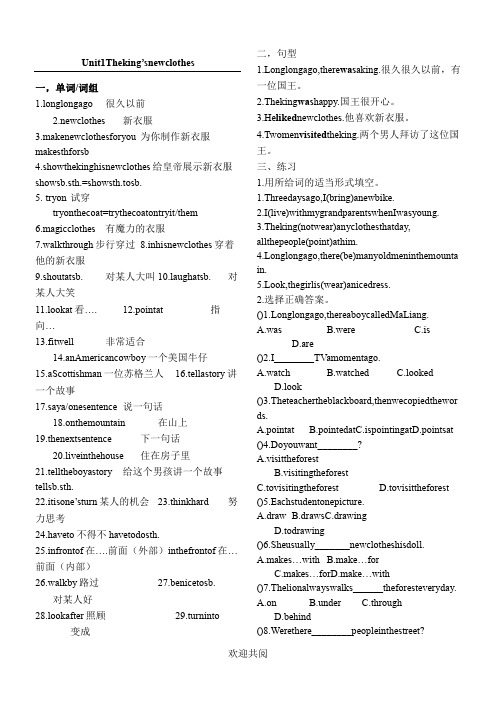
Unit1Theking’snewclothes一,单词/词组1.longlongago 很久以前2.newclothes 新衣服3.makenewclothesforyou 为你制作新衣服makesthforsb4.showthekinghisnewclothes给皇帝展示新衣服showsb.sth.=showsth.tosb.5.tryon 试穿tryonthecoat=trythecoatontryit/them6.magicclothes 有魔力的衣服7.walkthrough步行穿过8.inhisnewclothes穿着他的新衣服9.shoutatsb. 对某人大叫 ughatsb. 对某人大笑11.lookat看….12.pointat 指向…13.fitwell 非常适合14.anAmericancowboy一个美国牛仔15.aScottishman一位苏格兰人16.tellastory讲一个故事17.saya/onesentence 说一句话18.onthemountain 在山上19.thenextsentence 下一句话20.liveinthehouse 住在房子里21.telltheboyastory 给这个男孩讲一个故事tellsb.sth.22.itisone’sturn某人的机会23.thinkhard 努力思考24.haveto不得不havetodosth.25.infrontof在….前面(外部)inthefrontof在…前面(内部)26.walkby路过27.benicetosb.对某人好28.lookafter照顾29.turninto变成二,句型1.Longlongago,there was aking.很久很久以前,有一位国王。
2.Theking was happy.国王很开心。
3.He liked newclothes.他喜欢新衣服。
4.Twomen visited theking.两个男人拜访了这位国王。
(完整)六年级英语一般将来时练习

六年级英语一般将来时练习(1)将来时;_________________________________________二. 用所给动词的正确形式填空1.I (do) my homework tonight.2.We (water) the flowers this afternoon.3.He (buy) a CD next Saturday.4.You (read) books on the weekend.5.They (go) the cinema this evening.6.My parents (fly) to Beijing tomorrow.7.Mike (watch )TV this evening.8.Amy (have) a busy weekend.9.Lily (read) books on Saturday morning.10.Tom and Jack (watch )TV on Saturday afternoon.11.She (go )shopping on Sunday morning.12.He (play) football this afternoon.13. I (go)hiking this afternoon.三. 改一般疑问句和否定句, 并作否定回答和肯定回答。
1...........................?I am going to visit my grandparents this weekend.2...........................?He is going to the school tomorrow. 3...........................?They are going to the library. 4...........................?we are going to plant trees this weekend. 5...........................?Mike is going to watch TV this evening.6.Liu Yun is going to read books this Saturday.7.John is going to the theme park this weekend.8.She is going next Tuesday.9. Sarah is going to be an English teacher one day.四、划线部分提问(常用疑问词: what, where, when, how, who)1.A:___________________________________________B: I’m going to visit my grandparents this weekend.2.A:_________________________________________B: I’m going to the bookstore this afternoon.3. A:________________________________________ B: My father is going to Beijing with me.4.A:___________________________________________ B: He’s going to plant trees this weekend.5:A:___________________________________________ B: I’m going to the park at 3 o’cloc k.6.A:___________________________________________ B: My sister is going to visit the Great Wall next year.7.A:___________________________________________ B:T hey’re going to the zoo tomorrow.8.A:___________________________________________ B: Tom and John are going to take a trip this weekend.9A:___________________________________________ B:They are going to Shanghai by plane.10.A:___________________________________________? B:she is going to buy a book on the weekend11.A:___________________________________________? B:she is going to buy a book on the weekend 12. .A:_____________________________B:We are going to take a trip tomorrow.13. A:________________________________B: Sarah is going to buy a comic book .14. A:________________________________.B: They are going to the cinema this evening.15. A: __________________________________B: Mike is going to the park next week.16. A: __________________________________B: I’m going to the zoo by bike.17. A: _________________________________B: Yes, I am going to read books tonight.18. A: _________________________________B: she is going to play basketball after school.19. A:__________________________________B: I go there on foot.五.根据答句写问句1.A:____________________________________________?B:I’m going to visit my grandparents on the weekend 2.A:____________________________________________? B:We are going to go hiking this afternoon.3.A:____________________________________________? B:Mike is going to watch TV this evening.4.A:____________________________________________? B:Liu Yun is going to read books this Saturday.5.A:____________________________________________? B:They are going to take a trip next week.6.A:____________________________________________? B: I’m going to the bookstore tomorrow.7.A:____________________________________________? B: We are going to the cinema this evening.8.A:____________________________________________? B: John is going to the theme park this weekend.9.A:____________________________________________? B: They are going to the Great Wall next month.10.A:__________________________________________? B:I’m going at 2:30.11.A:_________________________________________ ? B:I am going to visit my grandparents this weekend.12.A:_________________________________________? B:He is going to the cinema this afternoon.13.A:________________________________________? B:She is going next Tuesday.14.A:_________________________________________? B:They are going to Shanghai by plane.15.A:_________________________________________? B:Mike and Amy are going to the Great Wall this weekend.16.A:_________________________________________? B:She wants to be a science teacher in the future.17.A:_________________________________________? B:Sarah is going to be an English teacher one day.18.A:___________________________________________? B:Mary is going at 8:10.19.A:___________________________________________? B:They are going at 9:25.20.A:___________________________________________?B:I’m going to the hospital by bus.21.A:________________________________________?B: We are going to the post office on foot.22.A:________________________________________?B:Amy is going to the library by bike.23.A:________________________________________?B: They are going to the shoe store by car.24.A:________________________________________?B:Yes.I’m going to the hospital by bus.25.A:________________________________________?B:No.We are going to the post office on foot.26.A:_________________________________________B:Yes.Amy is going to the library by bike.27.A:________________________________________?B:No.They are going to the shoe store by car.六、短文填空。
(完整word版)苏教版6A牛津英语语法总复习及练习
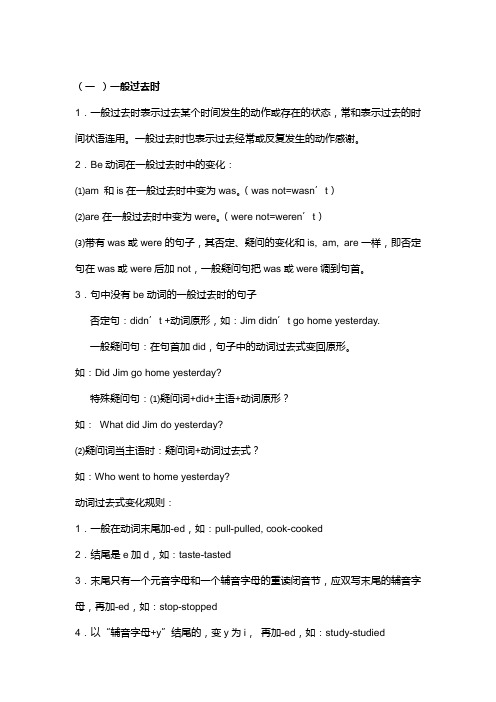
(一)一般过去时1.一般过去时表示过去某个时间发生的动作或存在的状态,常和表示过去的时间状语连用。
一般过去时也表示过去经常或反复发生的动作感谢。
2.Be动词在一般过去时中的变化:⑴am 和is在一般过去时中变为was。
(was not=wasn’t)⑵are在一般过去时中变为were。
(were not=weren’t)⑶带有was或were的句子,其否定、疑问的变化和is, am, are一样,即否定句在was或were后加not,一般疑问句把was或were调到句首。
3.句中没有be动词的一般过去时的句子否定句:didn’t +动词原形,如:Jim didn’t go home yesterday.一般疑问句:在句首加did,句子中的动词过去式变回原形。
如:Did Jim go home yesterday?特殊疑问句:⑴疑问词+did+主语+动词原形?如:What did Jim do yesterday?⑵疑问词当主语时:疑问词+动词过去式?如:Who went to home yesterday?动词过去式变化规则:1.一般在动词末尾加-ed,如:pull-pulled, cook-cooked2.结尾是e加d,如:taste-tasted3.末尾只有一个元音字母和一个辅音字母的重读闭音节,应双写末尾的辅音字母,再加-ed,如:stop-stopped4.以“辅音字母+y”结尾的,变y为i,再加-ed,如:study-studied过去时练习写出下列动词的过去式is\am_________ fly_______ plant________ are ________drink_________ play_______ go________ make ________does_________ dance________ worry________ ask _____taste_________ eat__________ draw________ put ______throw________ kick_________ pass_______ do ________一、用行为动词的适当形式填空1. He _________ (live) in Wuxi two years ago.2. The cat ________ (eat) a bird last night.3. We _______ (have) a party last Halloween.4. Nancy ________ (pick) up oranges on the farm last week.5. I ________ (make) a model ship with Mike yesterday.6. They ________ (play) chess in the classroom last PE lesson.7. My mother _______ (cook) a nice food last Spring Festival.8. The girls ________ (sing) and _______ (dance) at the party.9. I ______ (watch) a cartoon on Saturday.10. Her father _______ (read) a newspaper last night.11. We _________ to zoo yesterday, we _____ to the park. (go)12. ______ you _______ (visit) your relatives last Spring Festival?13. ______ he _______ (fly) a kite on Sunday? Yes, he ______.14. Gao Shan _______ (pull) up carrots last National Day holiday.15. I ____________ (sweep) the floor yesterday, but my mother ______.16. What ______ she _______ (find) in the garden last morning? She __________ (find) a beautiful butterfly.二、句型转换1. Su Hai took some photos at the Sports day.否定句:________________________________________________一般疑问句:____________________________________________肯、否定回答:__________________________________________2. Nancy went to school early.否定句:________________________________________________一般疑问句:____________________________________________肯、否定回答:__________________________________________过去时综合练习一、用动词的适当形式填空1. It ______ (be) Ben’s birthday last Friday.2. We all ______ (have) a good time last night.3. He ________ (jump) high on last Sports Day.4. Helen ________ (milk) a cow on Friday.5. She likes ______ newspapers, but she ______ a book yesterday. (read)6. He _______ football now, but they _______ basketball just now. (play)7. Jim’s mother _________ (plant) trees just now.8. _______ they ________ (sweep) the floor on Sunday? No, they _____.9. I _______ (watch) a cartoon on Monday.10. We ___________ (go) to school on Sunday11. It _____ (be) the 2nd of November yesterday. Mr White ________ (go) to his office by car.12. Gao Shan ________ (put) the book on his head a moment ago.13. Don’t ______ the house. Mum _______ it yesterday. (clean)14. What ____ you ______ just now? I _______ some housework. (do)15. They _________ (make) a kite a week ago.16. I want to ______ apples. But my dad _______ all of them last month. (pick)17. _______ he ______ the flowers this morning? Yes, he _____. (water)18. She ____ (be) a pretty girl. Look, she _____ (do) Chinese dances.19. The students often _________ (draw) some pictures in the art room.20.What ______ Mike do on the farm? He ________ cows. (milk)二、中译英1. 我们上周五看了一部电影。
(完整版)小学六年级英语一般将来时练习
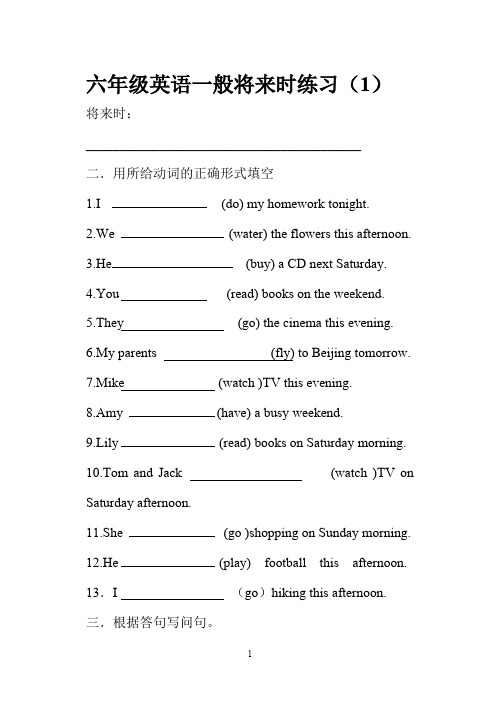
六年级英语一般将来时练习(1)将来时;_________________________________________二.用所给动词的正确形式填空1.I (do) my homework tonight.2.We (water) the flowers this afternoon.3.He (buy) a CD next Saturday.4.You (read) books on the weekend.5.They (go) the cinema this evening.6.My parents (fly) to Beijing tomorrow.7.Mike (watch )TV this evening.8.Amy (have) a busy weekend.9.Lily (read) books on Saturday morning.10.Tom and Jack (watch )TV on Saturday afternoon.11.She (go )shopping on Sunday morning.12.He (play) football this afternoon. 13.I (go)hiking this afternoon.三.根据答句写问句。
1. ?I am going to visit my grandparents this weekend.2. ? He is going to the school tomorrow.3. ? They are going to the library.4. ? we are going to plant trees this weekend.5. ? Mike is going to watch TV this evening.6. ? Liu Yun is going to read books this Saturday.7. ? John is going to the theme park this weekend.8. ? She is going next Tuesday.9. ? Sarah is going to be an English teacher one day.四、划线部分提问(常用疑问词:what, where, when, how, who)1.A:___________________________________________ B: I’m going to visit my grandparents this weekend.2.A:_________________________________________B: I’m going to the bookstore this afternoon.3.A:________________________________________ B: My father is going to Beijing with me.4.A:___________________________________________ B: He’s going to plant trees this weekend.5:A:___________________________________________ B: I’m going to the park at 3 o’clock.6.A:___________________________________________ B: My sister is going to visit the Great Wall next year.7.A:___________________________________________ B:They’re going to the zoo tomorrow.8.A:___________________________________________ B: Tom and John are going to take a trip this weekend.9A:___________________________________________ B:They are going to Shanghai by plane.10.A:___________________________________________? B:she is going to buy a book on the weekend11.A:___________________________________________?B:she is going to buy a book on the weekend 12..A:_____________________________B:We are going to take a trip tomorrow.13.A:________________________________B: Sarah is going to buy a comic book .14.A:________________________________.B: They are going to the cinema this evening.15.A: __________________________________B: Mike is going to the park next week.16.A: __________________________________B: I’m going to the zoo by bike.17.A: _________________________________B: Yes, I am going to read books tonight.18.A: _________________________________B: she is going to play basketball after school.19.A:__________________________________B: I go there on foot.五.根据答句写问句1.A:____________________________________________? B:I’m going to visit my grandparents on the weekend2.A:____________________________________________? B:We are going to go hiking this afternoon.3.A:____________________________________________? B:Mike is going to watch TV this evening.4.A:____________________________________________? B:Liu Yun is going to read books this Saturday.5.A:____________________________________________? B:They are going to take a trip next week.6.A:____________________________________________? B: I’m going to the bookstore tomorrow.7.A:____________________________________________? B: We are going to the cinema this evening.8.A:____________________________________________? B: John is going to the theme park this weekend.9.A:____________________________________________? B: They are going to the Great Wall next month.10.A:__________________________________________? B:I’m going at 2:30.11.A:_________________________________________ ?B:I am going to visit my grandparents this weekend.12.A:_________________________________________? B:He is going to the cinema this afternoon.13.A:________________________________________? B:She is going next Tuesday.14.A:_________________________________________? B:They are going to Shanghai by plane.15.A:_________________________________________? B:Mike and Amy are going to the Great Wall this weekend.16.A:_________________________________________? B:She wants to be a science teacher in the future.17.A:_________________________________________? B:Sarah is going to be an English teacher one day.18.A:___________________________________________?B:Mary is going at 8:10.19.A:___________________________________________?B:They are going at 9:25.20.A:___________________________________________?B:I’m going to the hospital by bus.21.A:________________________________________?B: We are going to the post office on foot.22.A:________________________________________?B:Amy is going to the library by bike.23.A:________________________________________?B: They are going to the shoe store by car.24.A:________________________________________?B:Yes.I’m going to the hospital by bus.25.A:________________________________________?B:No.We are going to the post office on foot.26.A:_________________________________________B:Yes.Amy is going to the library by bike.27.A:________________________________________?B:No.They are going to the shoe store by car.六、短文填空。
小学六年级英语一般将来时练习题
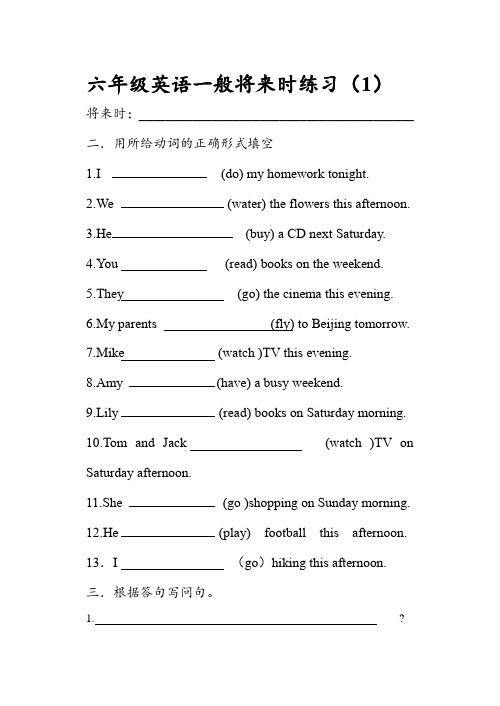
六年级英语一般将来时练习(1)将来时;_________________________________________二.用所给动词的正确形式填空1.I (do) my homework tonight.2.We (water) the flowers this afternoon.3.He (buy) a CD next Saturday.4.You (read) books on the weekend.5.They (go) the cinema this evening.6.My parents (fly) to Beijing tomorrow.7.Mike (watch )TV this evening.8.Amy (have) a busy weekend.9.Lily (read) books on Saturday morning.10.Tom and Jack (watch )TV on Saturday afternoon.11.She (go )shopping on Sunday morning.12.He (play) football this afternoon. 13.I (go)hiking this afternoon.三.根据答句写问句。
1. ?I am going to visit my grandparents this weekend.2. ? He is going to the school tomorrow.3. ? They are going to the library.4. ? we are going to plant trees this weekend.5. ? Mike is going to watch TV this evening.6.? Liu Yun is going to read books this Saturday.7.? John is going to the theme park this weekend.8.? She is going next Tuesday.9.? Sarah is going to be an English teacher one day.四、划线部分提问(常用疑问词:what, where, when, how, who)1.A:___________________________________________ B: I’m going to visit my grandparents this weekend.2.A:_________________________________________B: I’m going to the bookstore this afternoon.3.A:________________________________________ B: My father is going to Beijing with me.4.A:___________________________________________ B: He’s going to plant trees this weekend.5:A:___________________________________________ B: I’m going to the park at 3 o’clock.6.A:___________________________________________ B: My sister is going to visit the Great Wall next year.7.A:___________________________________________ B:They’re going to the zoo tomorrow.8.A:___________________________________________ B: Tom and John are going to take a trip this weekend.9A:___________________________________________ B:They are going to Shanghai by plane.10.A:___________________________________________? B:she is going to buy a book on the weekend11.A:___________________________________________? B:she is going to buy a book on the weekend12..A:_____________________________B:We are going to take a trip tomorrow.13.A:________________________________B: Sarah is going to buy a comic book .14.A:________________________________.B: They are going to the cinema this evening.15.A: __________________________________B: Mike is going to the park next week.16.A: __________________________________B: I’m going to the zoo by bike.17.A: _________________________________B: Yes, I am going to read books tonight.18.A: _________________________________B: she is going to play basketball after school.19.A:__________________________________B: I go there on foot.五.根据答句写问句1.A:____________________________________________? B:I’m going to visit my grandparents on the weekend2.A:____________________________________________?B:We are going to go hiking this afternoon.3.A:____________________________________________? B:Mike is going to watch TV this evening.4.A:____________________________________________? B:Liu Yun is going to read books this Saturday.5.A:____________________________________________? B:They are going to take a trip next week.6.A:____________________________________________? B: I’m going to the bookstore tomorrow.7.A:____________________________________________? B: We are going to the cinema this evening.8.A:____________________________________________? B: John is going to the theme park this weekend.9.A:____________________________________________? B: They are going to the Great Wall next month.10.A:__________________________________________? B:I’m going at 2:30.11.A:_________________________________________ ? B:I am going to visit my grandparents this weekend.12.A:_________________________________________? B:He is going to the cinema this afternoon.13.A:________________________________________? B:She is going next Tuesday.14.A:_________________________________________? B:They are going to Shanghai by plane.15.A:_________________________________________? B:Mike and Amy are going to the Great Wall this weekend.16.A:_________________________________________? B:She wants to be a science teacher in the future.17.A:_________________________________________? B:Sarah is going to be an English teacher one day.18.A:___________________________________________? B:Mary is going at 8:10.19.A:___________________________________________? B:They are going at 9:25.20.A:___________________________________________? B:I’m going to the hospital by bus.21.A:________________________________________?B: We are going to the post office on foot.22.A:________________________________________?B:Amy is going to the library by bike.23.A:________________________________________?B: They are going to the shoe store by car.24.A:________________________________________?B:Yes.I’m going to the hospital by bus.25.A:________________________________________?B:No.We are going to the post office on foot.26.A:_________________________________________B:Yes.Amy is going to the library by bike.27.A:________________________________________?B:No.They are going to the shoe store by car.六、短文填空。
江苏译林(牛津)版英语六年级上册知识点整理

六年级上册复习资料内含:6A各单元知识点,语法知识,易错题及适当形式填空6A Unit 1 The king’s new clothes姓名:一,单词/词组1. long long ago 很久以前2. new clothes 新衣服3. make new clothes for you 为你制作新衣服 make sth for sb4. show the king his new clothes给皇帝展示新衣服show sb. sth.= show sth. to sb.5. try on 试穿try on the coat=try the coat ontry it/them on6. magic clothes 有魔力的衣服7. walk through步行穿过8. in his new clothes 穿着他的新衣服9. shout at sb. 对某人大叫10. laugh at sb. 对某人大笑11. look at 看…. 12. point at 指向…13. fit well 非常适合14. an American cowboy 一个美国牛仔15. a Scottish man 一位苏格兰人16. tell a story 讲一个故事17. say a/one sentence 说一句话18. on the mountain 在山上19. the next sentence 下一句话20. live in the house 住在房子里21. tell the boy a story 给这个男孩讲一个故事 tell sb. sth.22. it is one’s turn 某人的机会23. think hard 努力思考24. have to 不得不 have to do sth.25. in front of 在….前面(外部) in the front of 在…前面(内部)26. walk by 路过27. be nice to sb. 对某人好28. look after 照顾29. turn into 变成二,句型1. Long long ago, there was a king. 很久很久以前,有一位国王。
一般将来时练习六年级

一般将来时练习六年级
简介
一般将来时是英语中表示将来发生的动作或状态的时态。
在六年级的研究中,掌握一般将来时的用法对于学生来说非常重要。
本文档将提供一些练题,帮助六年级的学生进行一般将来时的练。
练题
1. 选择正确的动词形式填空:
- I __________ (goes/will go) to the park tomorrow.
- They __________ (is/will be) playing soccer this weekend.
- She __________ (do/will do) her homework later.
- We __________ (are/will be) having a party next week.
2. 用适当的一般将来时动词完成句子:
- I __________ (visit) my grandparents next month.
- They __________ (have) a picnic in the park tomorrow.
- She __________ (play) the piano at the concert next week.
- We __________ (watch) a movie this weekend.
3. 按要求改写下列句子(一般将来时变否定句和疑问句):
- He will draw a picture tomorrow. (否定句)
总结
通过这些练题,六年级的学生可以提高对一般将来时的理解和正确使用。
希望这些练能够帮助学生们在英语研究中取得更好的成绩。
六年级上册英语6A第七单元复习资料与复习题(苏教版牛津英语)
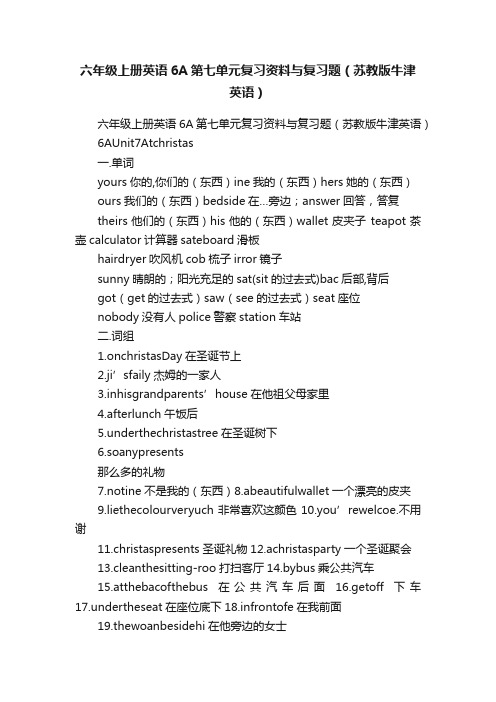
六年级上册英语6A第七单元复习资料与复习题(苏教版牛津英语)六年级上册英语6A第七单元复习资料与复习题(苏教版牛津英语)6AUnit7Atchristas一.单词yours你的,你们的(东西)ine我的(东西)hers她的(东西)ours我们的(东西)bedside在…旁边;answer回答,答复theirs他们的(东西)his他的(东西)wallet皮夹子teapot茶壶calculator计算器sateboard滑板hairdryer吹风机cob梳子irror镜子sunny晴朗的;阳光充足的sat(sit的过去式)bac后部,背后got(get的过去式)saw(see的过去式)seat座位nobody没有人police警察station车站二.词组1.onchristasDay在圣诞节上2.ji’sfaily杰姆的一家人3.inhisgrandparents’house在他祖父母家里4.afterlunch午饭后5.underthechristastree在圣诞树下6.soanypresents那么多的礼物7.notine不是我的(东西)8.abeautifulwallet一个漂亮的皮夹9.liethecolourveryuch非常喜欢这颜色10.you’rewelcoe.不用谢11.christaspresents圣诞礼物12.achristasparty一个圣诞聚会13.cleanthesitting-roo打扫客厅14.bybus乘公共汽车15.atthebacofthebus在公共汽车后面16.getoff下车17.undertheseat在座位底下18.infrontofe在我前面19.thewoanbesidehi在他旁边的女士20.waltothedriver走向司机21.ashitotaeitthepolicestation请求他把它带到警察局22.thepictureofthefootball足球的图片三.句子1.ThisoneisfroGranda.It’syours.这个是爷爷送的。
苏教版六年级英语(上)6A总结资料期末复习考点精练
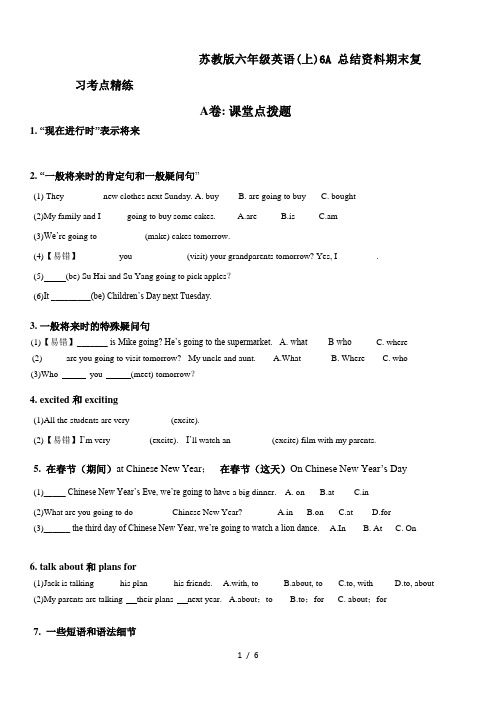
苏教版六年级英语(上)6A总结资料期末复习考点精练A卷: 课堂点拨题1. “现在进行时”表示将来2. “一般将来时的肯定句和一般疑问句”(1) They ________ new clothes next Sunday. A. buy B. are going to buy C. bought(2)My family and I _____ going to buy some cakes. A.are B.is C.am(3)We’re going to __________(make) cakes tomorrow.(4)【易错】_________you __________ (visit) your grandparents tomorrow? Yes, I ________ .(5) (be) Su Hai and Su Yang going to pick apples?(6)It _________(be) Children’s Day next Tuesday.3. 一般将来时的特殊疑问句(1)【易错】_______ is Mike going? He’s going to the supermarket. A. what B who C. where(2)_____ are you going to visit tomorrow? My uncle and aunt. A.What B. Where C. who(3)Who you (meet) tomorrow?4. excited 和 exciting(1)All the students are very _________(excite).(2)【易错】I’m very ________ (excite). I’ll watch an _________(excite) film with my parents.5.在春节(期间)at Chinese New Year;在春节(这天)On Chinese New Year’s Day(1)_____ Chinese New Year’s Eve, we’re going to ha ve a big dinner. A. on B.at C.in(2)What are you going to do ________ Chinese New Year? A.in B.on C.at D.for(3)______ the third day of Chinese New Year, we’re going to watch a lion dance. A.In B. At C. On6. talk about 和 plans for(1)Jack is talking _____ his plan _____ his friends. A.with, to B.about, to C.to, with D.to, about(2)My parents are talking their plans next year. A.about;to B.to;for C. about;for7.一些短语和语法细节(1)Nancy often gets emails _________ her friends. A. from B to C. with(2)Let’s ____________tangyuan together. A. to make B making C.make(3)_______ nice fireworks! A.How B.What’s C.What(4)The cook is ____ at a cookbook to ____us some nice food.A.Look, cook B.looking , cook C.looking, cookingB卷: 课后巩固题一.选择( )1.A: What did you do last Mid-Autumn Festival? B:I ______.A. got red packetsB. watched the moonC.eat tangyuan( )2.The teacher is talking his students holidays. A.to;to B.to;about C. about;to ( )3. nice picture! A.How B.What a C.What( )4.Do you often have lunch ________ your family? A.and B.with C.in( )5.Chinese New Year is in January ________ February. A.and B.or C.but( )6.-- you and your mother going to watch a film this evening? -- Yes; .A.Is;we’reB.Are;we’reC. Are;we are二.填入适当的词1.watch(过去式)2.next(反义词)3.plan(现在分词)4.There are a lot of __________(firecracker)on the ground.5.Mike _______ (get) an email yesterday.6.Miss Li__________(buy) some flowers last Sunday.7.【易错】It was nice ______(get) your email.8.______ you _______ ( watch ) a lion dance last year?9.【易错】SuYang’s mother often _________(make) tangyuan. She’s__________(make) some this evening.10. (child) Day is in June.11.【易错】I am happy (get) your email.12.Mike and Helen _______________(buy)some food tomorrow.13.Miss Li__________(buy) some flowers last week.14.My family ______________(watch) a lion dance the day after tomorrow.15.【易错】It (be) the Women’s Day.16.【易错】There (be) a dancing lesson tomorrow morning.17.When you18.What ________he _________ do tomorrow? He __________ ( visit ) his aunt.19.I’m _______(excite)about Children’s Day too.20.What are you going to do _______(at/on) Chinese New Year?三.翻译1.在春节(期间)2.在春节(这天)3.在大年初二4.做蛋糕5.看烟花6.做汤圆7.在除夕8.讨论他们的假日计划9.对…兴奋10.他这个周末准备去拜访他的祖父母.He _____ _____ _____ _____ his grandparents this weekend .11.我父母将给我红包.My parents are ______ ______ give ______ ______ packets.12.下周将是新年.It ______ ______ ______ ______ Chinese New Year ______ ______.13.他明天准备去看舞狮表演吗?he going to tomorrow.14.他们下周准备做一些蛋糕吗?they going to ?15.明年你们将去参观上海博物馆吗?you the Shanghai Museum next year?16.他们将要在中秋节做什么?What are they _______ ________ ________ at the Mid-Autumn Festival?17.圣诞节快来了;所有的孩子都很兴奋.Christmas _______ _______. All the children are ______ ________.18.新年第一天;我们将要去拜访朋友.On ______ _______ ______ , we are going to ________ _______.19.They are (讨论他们的假日计划) in the classroom.20.同学们正在谈论他们的暑期计划. The students talking their plans the summer holiday.21.他们正在观看烟花.______ ______ ______ fireworks.22.我不知道怎样写英文邮件I don’t know how _______ _______ _______ English email.23.公园里有一场舞狮表演. There a in the park.四.连词成句;注意句子字母大小写和标点1.be;next;Chinese;to;Year;New;it’s;week;going(.)2.watch;the;we’re;fireworks;to;evening;going;in(.)3.are;to;going;what;you;do;on;Children’s Day(?)五.改错(先用铅笔圈出错误的地方;再在后面的横线上改正)1.What places are you going visit.2.They’re going to giving us some presents.3.Where are you going to do tomorrow.4.Nancy is looking at fireworks now.5.They buy some fruits this morning.6.We use pens write and draw.六.句型转换1.They are going to make tangyuan.(对划线部分提问)2.I’m going to buy some flowers(改为一般疑问句)3.The cook is looking at a book. (对划线部分提问)4.We are going to watch fireworks this evening (对划线部分提问)5.Liu Tao is going to Xi’an tomorrow. (对划线部分提问)6.We’re going to have a big dinner.(对划线提问)7.Mike’s going to watch a parrot show .(对划线提问)8.I’m going to buy some toys after school. (对划线提问)9.It is Mike’s birthday today. (用Tomorrow 替换today改写句子)It ________ ________ ________ ________ Mike’s birthday ________ .C卷: 复习提高题一. 选择( )1.Where _______ my new cap? I can’t ______ it. A.Was, look for B.are, lose C.is, find( )2.Smoke _____ cars makes the air dirty. We shouldn’t drive _____. A.from, so many B.of, so much C.from, so much ( )3.It’s going to ________ my birthday next Monday. A.is B.are C.be D./( )4.Who ________ you English? A.teach B.teaches C.teacher( )5.Chinese like ________ best.A.Thanksgiving B.Christmas C. Spring Festival D. New Year’s Day( )6.【易错】It was nice ________ your email. A.get B.gets C.to get D.to gets( )7.What do people usually do Christmas. A.on B.at C.in( )8. smoke is bad for our health. A. A lot B.Too many C. Too much( )9.The students start . A.write B.writing C.wrote( )10.--What you at the party. --I wrote a red dress. A.do;wear B.are;going to wear C.did;wear ( )11.--Can we watch fireworks? -- . A.Yes;you do B.No;you can’t C. No;we can’t二.填词1.Children usually __________ (sing) and _________(dance) on Children’s Day.2.Do you want ___________(learn) the names of festivals?3.My family _______ ( be ) in my grandparents’ house now.4.【易错】On _________ ( three ) day of Chinese New Year, we __________( light ) some firecrackers.5.【易错】Let me show you how (do) it.6.Look! It (rain) now.7.I don’t know how (fly) a kite. Can you teach me?8. you (go) to the park yesterday?9.There is something (eat).三.句型转换1.【易错】What a nice cake! (How开头感叹句)How ______ the ______ ______.2.I’m going to pick oranges on the farm. (改为否定句)3.The cook is looking at a cookbook. (对划线提问)4.They are going to play football after school. (对划线提问)5.Are you going to play the violin?(改为陈述句)四.阅读理解【一】The Spring Festival is our Chinese people’s festival. There are different names for each year. We all call it the year of Monkey, the year of Dog…and this year is the year of Horse.Before the day of the festival, people are busy shopping and cleaning. On the Eve, there is a big family dinner. After dinner, all the family stay up late (守夜)Year” to each other.根据短文内容;选择正确的答案.()1.There are ____ different names for Chinese years. A.10 B 11 C. 12( ) 2. When is the Chinese New Year’s Eve?A. The evening of the Spring FestivalB. The evening before the Spring FestivalC. The evening after the Spring Festival ( ) 3. People ________ before the Spring Festival.A. Sing and dance .B. play gamesC. go shopping and clean the house( ) 4. ________ are the favourite food for Chinese people on the Eve. A.Cakes B. Dumplings C. Noodles ( ) 5. On the festival people usually ______. A. wear new clothes B. go to visit their relatives C. A and B【二】Spring Festival is the most important(最重要的)festival in China.Before it, people usually clean their houses,buy new clothes, shoes and a lot of food. On the eve(前夜)of the festival, people cook delicious food and the whole(全部的)family have a big dinner together. People stay up late(熬夜)to eat dumplings at midnight forgood luck. But in my hometown(家乡);we often eat sweet rice dumplings. It means family reunion(团圆).On that day, there is no sweeping because(因为)people think it will sweep away good luck(好运).I like Spring Festival, because it means new clothes, shoes, many presents and a fifteen-day holiday. I play cards,visit relatives and friends, and eat delicious food. It’s a holiday full of love and joy(快乐)for us.根据短文内容;判断正(T)误(F).( ) 1.Spring Festival is the most important festival in China.( ) 2.At Spring Festival, people often go shopping.( ) 3. At Spring Festival, people have a big dinner with their family. ( ) 4. Eating dumplings means good luck.( ) 5.I like Spring Festival because it is a holiday full of love and food.。
苏教译林 六年级英语上册 6A 期末复习 语法和句型专项(含答案)
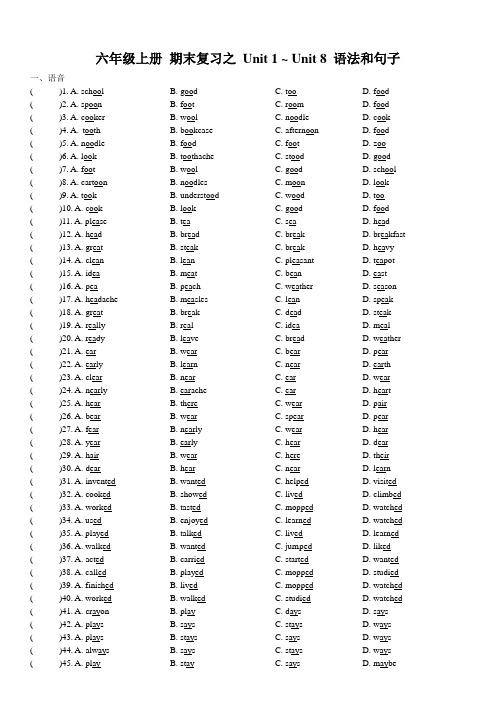
六年级上册期末复习之Unit 1 ~ Unit 8 语法和句子一、语音( )1. A. school B. good C. too D. food ( )2. A. spoon B. foot C. room D. food ( )3. A. cooker B. wool C. noodle D. cook ( )4. A. tooth B. bookcase C. afternoon D. food ( )5. A. noodle B. food C. foot D. zoo ( )6. A. look B. toothache C. stood D. good ( )7. A. foot B. wool C. good D. school ( )8. A. cartoon B. noodles C. moon D. look ( )9. A. took B. understood C. wood D. too ( )10. A. cook B. look C. good D. food ( )11. A. please B. tea C. sea D. head ( )12. A. head B. bread C. break D. breakfast ( )13. A. great B. steak C. break D. heavy ( )14. A. clean B. lean C. pleasant D. teapot ( )15. A. idea B. meat C. bean D. east ( )16. A. pea B. peach C. weather D. season ( )17. A. headache B. measles C. lean D. speak ( )18. A. great B. break C. dead D. steak ( )19. A. really B. real C. idea D. meal ( )20. A. ready B. leave C. bread D. weather ( )21. A. ear B. wear C. bear D. pear ( )22. A. early B. learn C. near D. earth ( )23. A. clear B. near C. ear D. wear ( )24. A. nearly B. earache C. ear D. heart ( )25. A. hear B. there C. wear D. pair ( )26. A. bear B. wear C. spear D. pear ( )27. A. fear B. nearly C. wear D. hear ( )28. A. year B. early C. hear D. dear ( )29. A. hair B. wear C. here D. their ( )30. A. dear B. hear C. near D. learn ( )31. A. invented B. wanted C. helped D. visited ( )32. A. cooked B. showed C. lived D. climbed ( )33. A. worked B. tasted C. mopped D. watched ( )34. A. used B. enjoyed C. learned D. watched ( )35. A. played B. talked C. lived D. learned ( )36. A. walked B. wanted C. jumped D. liked ( )37. A. acted B. carried C. started D. wanted ( )38. A. called B. played C. mopped D. studied ( )39. A. finished B. lived C. mopped D. watched ( )40. A. worked B. walked C. studied D. watched ( )41. A. crayon B. play C. days D. says ( )42. A. plays B. says C. stays D. ways ( )43. A. plays B. stays C. says D. ways( )46. A. may B. day C. says D. pay ( )47. A. water B. wash C. watch D. what ( )48. A. apple B. cake C. make D. name ( )49. A. uncle B. English C. think D. student ( )50. A. wall B. also C. talk D. walk二、翻译下列词组1. 买一些新衣服和食物______________________2. 在除夕夜______________________3. 下午看舞狮______________________4. 在春节期间______________________5. 寻找一些好的东西______________________6. 谈论他们新年的计划______________________7. 对他们说“再见”______________________8. 在厨房煮饺子______________________9. 最重要的节日______________________10. 制作一个海报______________________11. 保护地球______________________12. 砍树______________________13. 用水清洗东西______________________14. 大多数能源______________________15. 使用太多塑料______________________16. 对地球有坏处______________________17. 滑倒在香蕉皮______________________18. 使街道变脏______________________19. 放学后步行回家______________________20. 来自工厂的黑烟______________________21. 帮助保持空气干净______________________22. 看见很多猴子围绕着他们__________________23. 小心______________________24. 带宠物进商店______________________25. 等待答案______________________ 26. 朝窗户外看______________________27. 用鸡蛋造句______________________28. 美国人______________________29. 每天工作努力______________________30. 在度假______________________31. 做很多事情______________________32. 用电话给人们打电话______________________33. 在网上看新闻______________________34. 听收音机______________________35. 在学校交朋友______________________36. 来自全世界的朋友______________________37. 在网上购物______________________38. 对……表演感到兴奋______________________39. 进展顺利______________________40. 起初______________________41. 大雨______________________42. 多有趣!______________________43. 回家晚______________________44. 看见很多有趣的事情______________________45. 靠近星星湖的一个农场____________________46. 抓住一条大鱼______________________47. 在周一早上______________________48. 想知道为什么______________________49. 多么糟糕的一天!______________________50. 努力地想______________________三、翻译下列句子1. 我们钓到了一条大鱼。
六年级英语一般将来时讲解加练习

一般将来时一般将来时的定义:一般将来时表示将来某个时间要发生的动作或存在的状态,及计划、打算或准备做某事。
常常与表示将来的时间状语连用。
一般将来时的标志词:tomorrow, next day(week, month, year…),soon,the day after tomorrow(后天)等。
一般将来时的结构:(一)“will +动词原形”这一形式,主要用于在以下几个方面: 1、表示单纯的未来“将要”通用于各个人称。
They will go to visit the factory tomorrow. 明天他们将去工厂参观。
I’ll come with Wang Bing and Yang Ling. 我将和王兵、杨玲一起来。
The rain will stop soon. 雨很快就要停了。
(二)“be going to+动词原形”的形式,表示事先经过考虑、安排好打算、计划要做的事情以及已有迹象表明必将发生某事,意为“打算;就要”。
如:1)We're going to meet outside the school gate. 我们打算在校门口见面。
2)Dad and I are going to watch an opera this afternoon. 今天下午我和爸爸打算去看歌剧。
3)Look! It's going to rain. 瞧!快下雨了。
练习一.填空brother ______ (go) to Shanghai next week.________ (see) her grandfather tomorrow.________ (fly) kites in the park this weekend.(make) a plan for English study in three days._______ (be) going to learn a new song next Tuesday(be) you going to Beijing tomorrow_______ (not be) going to have lunch at 12:00 tomorrow.8. Where _______ you _______ (leave) for tomorrowTom _______ (have) a . lesson next Monday10. What _______ they _______ (watch) in thegym tomorrow_____ they _______( do ) tomorrowboy _______( not have ) an English lesson tomorrow .you _______( learn ) Chinese next week________ ( arrive ) there tomorrow ._________ ( not watch ) a movie tomorrow .二.选择填空1. ( ) She is going to ________ after school.A. listening to musicB. listens to musicC. listen to musicD. listened to music2. ( ) We _______ in Beijing in two days.A. will arrivesB. arrivesC. are going to arriveD. arriving3. ( )The students ________ dumplings tomorrow.A. is going to makingB. are makingC. will makeD. are make4. ( ) Are you going to_________ thirteen years old next yearA. will beB. areC. beD. go5. ( ) ___will see a play in 5 daysA. WhenB. WhatC. WhoD. Whose6. ( ) Mary______ English next year.A. will learnB. will to learnC. are going to learn.D. learns7. ( ) He’ll _____ shopping this afternoon.A. goingB. goC. goesD. went8. ( ) Will you ____ at the bus stop at 10:30A. meetingB. meetsC. meetD. met9. ( ) Lily and I _______ the guitar. next week.A. am going to playB. are going to playC. will playsD. play10. ( ) How ______ Jenny ___ home tomorrowA. does......goB. is……goingC. will……goD. do……go11. ( ) Who is going to _________ a songA. sings B singing C. to sing D. sing12. ( ) I _________in Beijing in three days.A. are going to arriveB. arriveC. will arriveD. arrives13. ( ) He _______some model planes tomorrow .A. going to makeB. is makingC. will make D makes14. ( ) Are you going to ___________a doctor next yearA. will beB.. areC. beD. are going to15. ( ) She ________ you make supper this evening .A. helpsB. will helpC. is helpingD. is going help三.把下列句子变成一般疑问句,并给出肯定和否定回答。
苏教版六年级英语期末复习资料

六年级英语上期末复习资料1, like +名复数(表示喜什么西)I like apples. She likes monkeys.like +ing (表示喜做什么事) Mike likes running. My sister likes playing thepiano.2, go +ing ( 表示去干什么事,往常指去做某运)go swimming , go fishing, go shopping.go+ to (do) (也表示去干什么事,作) go to play,go to see their aunt.3, would like = want (表示想要)(1)想要什么西,后边直接跟名:I would like some milk.(2)想要做什么事, would like to (do) = want to (do)(3)想成 want to be⋯⋯= would like to be4, need +to (do) (表示需要做某事) You need to clean you desk.try +to (do) (表示着做某事) The students are trying to follow the oders.have+ to (do) / has +to (do) / had+ to (do) (表示不得不做某事) have, has ,had要随主和化。
how +to (do) (表示怎做某事)How to go to the shopping centre.can’ t wait +to(do)(表示等不及做某事) I can’t wait to eat the cake.5, shall we +原形(我做⋯.好)let / let’ s +原(⋯ .做)情( can, could, shall, should, must, will, would, may)+原形。
苏教版六年级英语期末复习资料

六年级英语上期末复习资料1, like + 名词复数(表示喜欢什么东西)I like apples. She likes monkeys.like + 动词 ing (表示喜欢做什么事) Mike likes running. My sister likes playing the piano.2, go + 动词 ing ( 表示去干什么事,通常指去做某项运动) go swimming , go fishing, go shopping.go+ to (do) (也表示去干什么事,强调动作 ) go to play, go to see their aunt.3, would like = want ( 表示想要 ) (1)想要什么东西,后面直接跟名词:I would like some milk.(2)想要做什么事, would like to (do) = want to (do)(3) 想成为want to be ⋯⋯ = would like to be4, need +to (do) ( 表示需要做某事) You need to clean you desk.try +to (do) ( 表示试着做某事) The students are trying to follow the oders.have+ to (do) / has +to (do) / had+ to (do) ( 表示不得不做某事)have, has ,had 要随主语和时态变化。
how +to (do) ( 表示怎样做某事) How to go to the shopping centre.can’twait +to(do)( 表示等不及做某事) I can’twait to eat the cake.5, shall we + 动词原形(我们做⋯ . 好吗?)let / let ’s + 动原(让⋯ .做)情态动词( can, could, shall, should, must, will, would, may ) +动词原形。
- 1、下载文档前请自行甄别文档内容的完整性,平台不提供额外的编辑、内容补充、找答案等附加服务。
- 2、"仅部分预览"的文档,不可在线预览部分如存在完整性等问题,可反馈申请退款(可完整预览的文档不适用该条件!)。
- 3、如文档侵犯您的权益,请联系客服反馈,我们会尽快为您处理(人工客服工作时间:9:00-18:30)。
六年级上U8一般将来时
一、概念:
表示将要发生的动作或存在的状态及打算、计划或准备做某事。
句中一般有以下时间状语:tomorrow, next day(week, month, year…),soon, this evening, the day after tomorrow(后天)等。
二、基本结构:①be going to(打算、将要) + 动词原形;②will(打算、将要)+ 动词原形.
三、否定句:在be动词(am, is, are)后加not或will+ not= won’t.
例如:I’m going to have a picnic this afternoon.→ I’m not going to have a picnic this afternoon.
I will have a picnic this afternoon. → I won’t have a picnic this afternoon.
四、一般疑问句:be或will提到句首,some改为any, and改为or,第一二人称互换,结尾加问号。
例如:I’m going to have a picnic this afternoon.→ Are you going to have a picnic this afternoon?
Yes, I am. / No, I am not.
I will have a picnic this afternoon. → Will you have a picnic this afternoon?
Yes, I will. / No, I won’t.
五、同义句:be going to = will
I am going to go swimming tomorrow(明天). = I will go swimming tomorrow.
练习:填空。
1. 我打算明天和朋友去野炊。
I_____ _______ _________ have a picnic with my friends.
= I ________ have a picnic with my friends.
2. 下个星期一你打算去干嘛? 我想去打篮球。
What ________ ________ _________ _________ _________ next Monday?
I _______ ______ _____ play basketball.
= What _________ you do next Monday? I ________ play basketball.
3. 你妈妈这个周末去购物吗?是,她要去买一些水果。
_____ your mother _______ ________ go shopping this ___________? Yes, she _________.
She ______ ________ __________ buy some fruit.
4. 你们打算什么时候见面。
What time _______ you _________ __________ meet?
改句子。
5. Nancy is going to go camping.(改否定)
Nancy ________ going to go camping.
6. I’ll go and join them.(改否定)
I _______ go ______ join them.
7. I’m going to get up at 6:30 tomorrow.(改一般疑问句)
________ _______ ________ to get up at 6:30 tomorrow?
8. We will meet at the bus stop at 10:30.(改一般疑问句)
_______ ________ meet at the bus stop at 10:30.
9. She is going to listen to music after school.(对划线部分提问)
________ _______ she ________ ________ _________ after school?
10. My father and mother are going to see a play the day after tomorrow.(同上)
_________ _________ going to see a play the day after tomorrow.
用所给词的适当形式填空。
1. Today is a sunny day. We ____________ (have) a picnic this afternoon.
2. My brother _______________ (go) to Shanghai next week.
3. Tom often _______(go) to school on foot. But today is rainy. He _____ _ (go) to school by bike.
4. What do you usually do at weekends? I usually __ __ (watch) TV and _ ___(catch) insects?
5. What _____she ______ (do) this weekend? She ________ (watch) TV and _______ (catch) insects.
6. What _________ (do) you do last Sunday? I _______ (pick) apples on a farm.
What _______you (do) next Sunday? I __________ (milk) cows.
7. Mary ____________ (visit) her grandparents tomorrow.
8. Liu Tao ____________ (fly) kites in the playground yesterday.
9. David ______________ (give) a puppet show next Monday.
10. I ________________ (plan) for my study now.。
